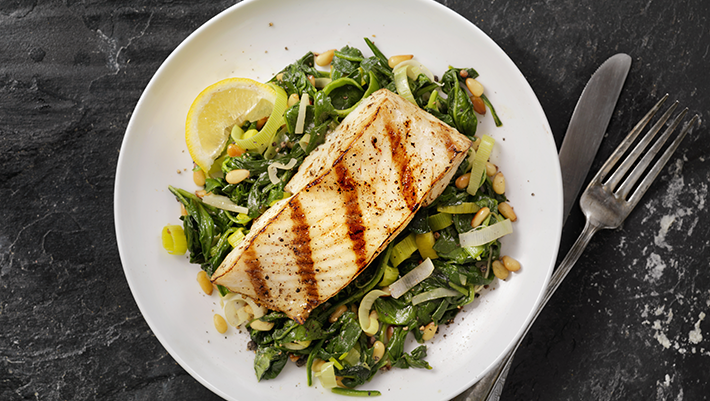
Find out more about why it’s good for you and how to choose more sustainable options
The wonders of fish
You will have heard how fish is good for you, being high in essential nutrients, good for your body and brain, but just how much should we be eating? Here we explain not only the amount of fish you should be including in your diet but also how to look for sustainably sourced produce.
Fish and shellfish are good sources of many vitamins and minerals. Oily fish – such as salmon and fresh tuna are also particularly high in omega-3 fatty acids, which benefit many areas of your health, from your heart to your brain. For a healthy diet, you should include at least two portions of fish a week – a portion is around 140g (4.9oz), which is about the size of a deck of cards. Ideally, one of these portions being oily. That might seem rather a lot, but when you consider the health benefits, it makes a great deal of sense.
Beware of the batter. Although most of us love a bit of battered fish, frying can increase the fat content of fish and shellfish (especially if they’re cooked in batter). So, for a healthier choice instead, try a smarter way to cook by steaming, baking or grilling.
You also want to ensure that the world doesn’t run out of our fishy friends. World fish stocks are being over-exploited which means you need to think carefully about your fish choices by eating a wide variety (try bream, catfish, seabass, hake, sturgeon, trout and more) there are so many to choose from while also buying from sustainable sources.
How much oily fish should you eat?
You should be looking at eating at least one portion (around 140g when cooked) of oily fish a week.
As well as oily fish containing essential omega-3 which benefits your heart, cholesterol levels and brain, it can also contain low levels of pollutants that can build up in the body. For this reason, there are maximum recommendations for the number of portions you eat each week. These recommendations are different for different groups of people:
- The general population. They are the lucky ones who can eat up to four portions of oily fish a week.
- Women who are planning a pregnancy or who are currently pregnant or breastfeeding
need to reduce this to no more than two portions of oily fish a week. This is because pollutants found in oily fish may affect the future development of a baby in the womb.
Eating sustainable fish and shellfish
So, we need to eat fish from sustainable sources, but what does that mean exactly and how do we go about it?
Unfortunately, overfishing endangers the future supply of fish as well as causing damage to the environment from which they are caught, which is not good. Sustainable fishing is when fish or shellfish are caught or produced in a way that allows stocks to replenish, as well as not causing unnecessary damage to marine animals and plants.
Think carefully when buying.
Firstly, choose from as wide a range of these foods as possible. This will ensure there are enough fish and shellfish to eat in the future. If we eat only a few kinds of fish, their numbers can fall to very low levels due to overfishing.
Secondly, look out for ecolabels on certified fish products at the supermarket, such as the blue Marine Stewardship Council logo or ask your local fishmonger.
If you are a keen bean and want to learn more about sustainable fish and shellfish, and what you can do to help, check out www.msc.org
Fish is the Dish
To find out more about how healthy fish is and how quick and easy it can be to cook, check out the Fish is the Dish website by Seafish for their fishy meal plans, blogs, tips and quick and easy recipes for you and the kids!
Come on. Lets eat more fish!
 Mindful Sodexo
Mindful Sodexo 
0 Comments